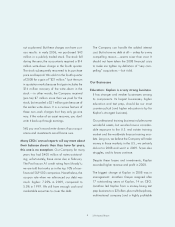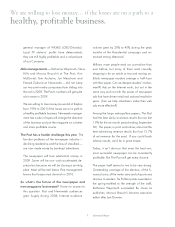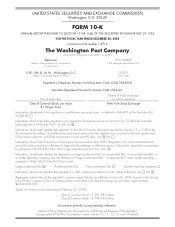Washington Post 2008 Annual Report Download - page 17
Download and view the complete annual report
Please find page 17 of the 2008 Washington Post annual report below. You can navigate through the pages in the report by either clicking on the pages listed below, or by using the keyword search tool below to find specific information within the annual report.amendments to the Federal Higher Education Act, a for-profit institution loses its eligibility to participate in the Title IV
programs for a period of at least two fiscal years if the institution derives more than 90% of its receipts from Title IV
programs for two consecutive fiscal years, commencing with the institution’s first fiscal year that ends after August 14,
2008. An institution with revenues exceeding 90% for a single fiscal year ending after August 14, 2008 will be placed
on provisional certification and may be subject to other enforcement measures. The aforementioned calculations are
performed on a Title IV reporting unit basis.
As a general matter, schools participating in Title IV programs are not financially responsible for the failure of their
students to repay Title IV loans. However, the Department of Education may fine a school, require a school to repay
Title IV program funds, limit or terminate a school’s eligibility to participate in the Title IV programs or take other
enforcement measures if it finds that the school has failed to comply with Title IV requirements or improperly disbursed or
retained Title IV program funds. In addition, there may be other legal theories under which a school could be sued as a
result of alleged irregularities in the administration of student financial aid.
Pursuant to Title IV program regulations, a school that undergoes a change in control must be reviewed and recertified by
the Department of Education. Certifications obtained following a change in control are granted on a provisional basis that
permits the school to continue participating in Title IV programs, but provides fewer procedural protections if the
Department of Education asserts a material violation of Title IV requirements. In accordance with Department of Education
regulations, a number of the schools in Kaplan’s Higher Education Division are combined into groups of two or more
schools for the purpose of determining compliance with Title IV requirements. All of the Higher Education Division’s 34
Title IV reporting units are fully certified.
The largest Title IV reporting unit in the Higher Education Division in terms of revenue is Kaplan University, which
accounted for approximately 49% of the Title IV funds received by the Division in 2008. For the most recent year for
which final data are available from the Department of Education, the cohort default rate for Kaplan University was
9.30%, and the cohort default rates for the other Title IV reporting units in Kaplan’s Higher Education Division averaged
14.88%; no reporting unit had a cohort default rate of 25% or more. In 2008, Kaplan University derived fewer than 85%
of its receipts from the Title IV programs, and other reporting units derived an average of fewer than 82% of their receipts
from Title IV programs, with no unit deriving more than 88% of its receipts from such programs.
In September 2008, the Department of Education began a Program Review at Kaplan Higher Education Division’s
CHI-Broomall campus. The program review is ongoing. The reviewers have completed their field work; however, they are
reviewing additional documentation provided by the school prior to issuing the program review report. CHI-Broomall and
Kaplan have responded to all requests for information and are cooperating fully in the review.
The Department of Education has also conducted Program Reviews at Kaplan Higher Education Division’s Pittsburgh and
Baltimore locations, which began in October 2007 and May 2008, respectively. Kaplan has responded to all requests
for information and is cooperating fully in these reviews. The Department of Education has not issued final reports on these
reviews.
The Company is presently not aware of any proceeding by the Department of Education to fine any Kaplan school for a
failure to comply with any Title IV requirement, or to limit, suspend or terminate the Title IV eligibility of any Kaplan school.
As noted previously, to remain eligible to participate in Title IV programs, a school must maintain its accreditation by an
accrediting agency recognized by the Department of Education. In 2008, no Kaplan school received notice from its
accreditors indicating that the school’s accreditation was being withdrawn or that the school was being issued a show
cause order.
No assurance can be given that the Kaplan schools currently participating in Title IV programs will maintain their Title IV
eligibility in the future or that the Department of Education might not successfully assert that one or more of such schools
have previously failed to comply with Title IV requirements.
All of the Title IV financial aid programs are subject to periodic legislative review and reauthorization. In addition, while
Congress historically has not limited the amount of funding available for the various Title IV student loan programs, the
availability of funding for the Title IV programs that provide for the payment of grants is primarily contingent upon the
outcome of the annual federal appropriations process.
Whether as a result of changes in the laws and regulations governing Title IV programs, a reduction in Title IV program
funding levels or a failure of schools included in Kaplan Higher Education to maintain eligibility to participate in Title IV
programs, a material reduction in the amount of Title IV financial assistance available to the students of those schools
would have a significant negative impact on Kaplan’s operating results. In addition, any development that has the effect
of making the terms on which Title IV financial assistance is made available materially less attractive could also adversely
affect Kaplan’s operating results.
2008 FORM 10-K 5
























